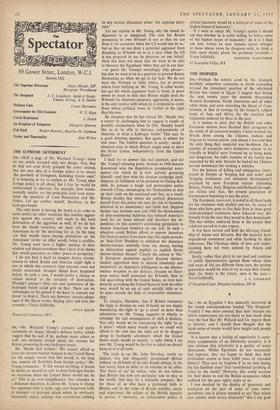SIR,—Mr. Wayland Young's cocksure and perky comments on Angus Maude's
defence policy article suggest that he and, if he, perhaps many others as well, are seriously misled about the reasons for Britain possessing its own hydrogen bomb.
Mr. Maude had written : 'We cannot afford to leave the thermo-nuclear weapon to the United States for the simple reason that this would, in the long run, remove all flexibility from foreign policy.' Mr. Young comments : 'If this means anything, it means he thinks we should be able to drop hydrogen bombs on occasions when the United States would not do so.' This is an over-simplification that amounts to a dishonest distortion. It allows Mr. Young to charge his opponent with 'a futile, ugly and dangerous faith in violence'—a personal attack which he obviously immensely enjo)s making—but contributes nothing
to any serious discussion about 'the supreme deter- rent.'
Let me explain to Mr. Young why his moral in- dignation is so misplaced. The case for Britain possessing its own H-bomb is not so that we can drop it 'on occasions when the US would not do so,' but so that we can deter a potential aggressor from dropping its H-bomb on us at a time when the US is not prepared to use its deterrent on our behalf. Now this does not mean that we want to be able to threaten the Egyptians 'when they get in our hair'
—to quote Mr. Young's revealingly silly phrase—
but that we want to be in a position to prevent Russia threatening us when we get in her hair. We do not want the 1-1-bomb to bully others, but to prevent others from bullying us. Mr. Young, in other words, has got the whole argument back to front. It never seems to occur to him that Britain might need the H-bomb for deterrent purposes; aggression, it seems, is the only motive with which he is prepared to credit those whose political views lie further to the right than his own.
He imagines That he has forced Mr. Maude into a corner by challenging him to suggest 'a couple of possible conjunctures when he [Mr. Maude] would like us to be able to threaten, independently of America, to drop a hydrogen bomb' This may be a good debating question. But again, it misses the real issue. The fruitful question is surely: could a situation arise in which Britain might need to• deter the Soviet Union, independently from the United States?
I shall try to answer this real question, and not Mr. Young's debating point. Assume in 1960 Senator Knowland wins the Republican presidential nomi- nation—for which he is now actively grooming himself—and then wins the election campaign itself.
Suppose, in fulfilment of his promises to Chiang Kai; shek, he pursues a tough and provocative policy towards China, encouraging the Nationalists to step up their raids on the mainland and that, as a result, Britain decides that unless she publicly dissociates herself from this policy she runs the risk of becoming involved in an unnecessary and futile war. Suppose further that between now and 1960 the development of inter-continental ballistics has reduced America's need for air bases abroad and therefore her de- pendence on this country's continuing permission to station American bombers on our soil. In such a situation could Britain afford to oppose American Far Eastern policy if we knew that this might provoke an 'Asia-First' President to withdraw the American thermo-nuclear umbrella from our shores, leaving us defenceless against implicit or explicit Soviet thermo-nuclear threats? Clearly the answer is 'No.'
If European protection against Russian thermo- nuclear aggression were to depend absolutely and exclusively on America's willingness to use thermo- nuclear weapons in our defence, because no Euro- pean nation itself possessed the H-bomb, then to risk quarrelling with the United States, or even tem- porarily provoking the United States to look the other way, would be an act of such suicidal folly as to be quite outside the field of responsible statesman- ship.
To imagine, therefore, that if Britain renounces the right to develop its own H-bomb we are simply renouncing the right to `go it alone' in more Suez adventures—as Mr. Young suggests—is wholly to misjudge the real consequences of such a decision.
Not only would we be renouncing the right `to go
it alone'—which many would agree we could well afford to do—but also the right not to be dragged
along in foolhardy adventures which the United States might decide to launch: a right which I am sure Mr. Young would be the first to admit we should hang on to at all costs.
The truth is—as Mr. John Strachey, surely no jingoist, has just eloquently proclaimed—Britain without an H-bomb of its own would always, in the last resort, have to defer to its enemies or its allies.
'For those of us,' he writes, 'who do not believe that Britain has now any particular role to play in the world, that may be a tolerable prospect. But for those of us who have a profound faith in Britain and in the value of British stability, sanity and experience, the eclipse of the British capacity to pursue, if necessary, an independent policy at critical junctures would be a betrayal of some of the highest hopes of humanity.'
If I were to adopt Mr. Young's tactics I should ask him whether he is really willing `to betray some of the highest hopes of humanity.' As it is I shall ask him, before he next imputes moral obloquy to those whose views he disagrees with, to think a little more deeply about the problems involved.—
41 Scarsdale Villas, W8


































 Previous page
Previous page